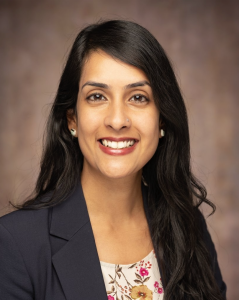WRITTEN BY: Priyanka Bist
The WCS Mentorship Program – Winter 2024 has come to an end and I’m feeling grateful for the insightful discussions and invaluable lessons I’ve learned this year. Our final event consisted of a fireside chat featuring three remarkable women—Arpita, Janet, and Julia who shared their career journeys and experiences in this industry and offered insights into the state of women’s representation in the sustainability and Clean Tech sector, along with strategies for navigating this dynamic industry.
Journeys of Julia, Janet, and Arpita
Each speaker shared their unique journey:
Stumbled in her role at the beginning of her career. With a background in business management and marketing, she transitioned from a role in meeting planning to a consulting company. Eventually, she ascended to the position of CEO at the Smart Electric Power Alliance (SEPA) at the young age of 27. Leading the company until 2020, Julia then took a 14-month hiatus. Recently returning from “retirement,” she now serves in advisory roles on various boards.
Drawing inspiration from her father, an aspiring electrical engineer who had to prioritize family over education, Janet decided to pursue his passion for electrical engineering. She graduated with distinction and earned a full scholarship for her Master’s degree. Throughout her career journey, Janet faced challenges, including being underestimated early on as the only female engineer in the room or on a site. Despite this, she persevered and rose through the ranks, currently holding the positions of Chief Strategy Officer and VP of Engineering at Tri-County Electric Cooperative.
Being a child of immigrants from Bangladesh, one of the most climate-vulnerable countries, Arpita developed a profound interest in climate change in her early years. This passion led her to work for a think tank and collaborate with influential public figures. Furthering her education with an MBA, Arpita honed her financial modeling skills and gained valuable experience at Credit Suisse’s power and renewables group. She later joined Sunpower, contributing to the development and financing of solar projects. Currently, she serves as the Chief Climate Officer and Senior Advisor at the US DOE, achieving recent success in leading a tribal energy finance program, which made its first loan guarantee of $80 million for a tribal microgrid in California.
Empowering Women in Clean Energy: Breaking Barriers
Despite comprising 32% of the renewable energy workforce, women are significantly underrepresented in leadership and technical roles, with only 10% occupying senior management positions. This disparity stems from various factors, including unequal access to education and limited technical training opportunities for women in the clean energy sector. Prevailing gender gaps persist, perpetuating the imbalance and impeding the full realization of women’s potential within the industry.
Challenges and Strategies
The pursuit of diversity within the clean energy sector is not only a matter of social equity but also a strategic imperative for industry growth and innovation. Diverse teams bring a wealth of perspectives and problem-solving approaches, fostering creativity and adaptability in addressing complex energy challenges.
However, women face unique barriers to career advancement in this evolving landscape. Despite the implementation of inclusivity policies by many companies, challenges persist. Women must navigate a maze of obstacles, from implicit biases to limited networking opportunities, while striving to progress in their chosen careers.
To overcome these challenges, while studies have shown that systemic issues around gender parity and pay still exist in the workplace, women need to be proactive in asking for what they want. Women must nurture career aspirations with determination and focus on continuous growth. This involves seizing opportunities for skill development, seeking out leadership roles, and advocating for oneself in the workplace. Additionally, establishing a robust support system is essential, including mentors who can provide guidance, networking opportunities, and insights into navigating the industry’s complexities.
By surrounding ourselves with supportive networks and mentors, women can navigate the dynamic landscape of the clean energy sector more effectively. These relationships inspire individuals to elevate their capabilities, providing invaluable guidance and encouragement while striving to overcome barriers and advance in their chosen careers.
Insights from Speakers:
Key to Success: humility, robust communication, and consistency
Julia candidly shared her experience as an introvert, highlighting the significance of nurturing relationships despite her natural inclination. She stressed the value of building connections while also underscoring the importance of humility in acknowledging and seeking solutions when faced with uncertainty. We all want to walk the walk and talk the talk, but there are times when your audience would rather you admit you don’t know the answer…but that you’ll find out.
In Janet’s view, success transcends mere acquaintance, emphasizing the need for visibility and proactive engagement to build allies with even the most ardent skeptics. She advocated for showcasing one’s capabilities to others, emphasizing the pivotal role of robust communication skills, particularly in male-dominated sectors. Janet also encouraged seeking mentors who challenge and propel personal growth. One example Janet highlighted was around building rapport and proving herself to adjacent team members. When they couldn’t win a client over and she volunteered to help, they begrudgingly said yes. When she was able to close the deal with the client, the naysayer became her best friend and wanted to learn how she’d done it.
Arpita’s perspective centered on consistency and staying grounded in the present. She emphasized the impact of diligent follow-up and advised focusing on current tasks rather than fixating on future endeavors. Arpita’s guidance underscored the importance of perseverance and dedication in navigating professional trajectories effectively.
Advice on Negotiation and Career Advancement
Janet offered pragmatic advice, stressing the importance of proving one’s worthwhile cautioning against a pushy approach. Drawing from her observations, she highlighted the risks associated with overly aggressive negotiation tactics, underscoring the value of receptivity to constructive feedback. She’s witnessed women (early-mid career) being too pushy for more salary and promotion and, unfortunately, alienated themselves. The strategy is to listen to why you didn’t get what you want, as it could be helpful. Janet also mentioned the fine line that women have to walk, unfortunately, between being seen as assertive versus aggressive.
Julia’s counsel centered on leveraging existing networks and avoiding unnecessary reinvention. She advocated for collaborative learning through cross-industry networking, emphasizing the resilience gained through embracing both successes and failures as integral parts of the career journey.
Arpita addressed the intricacies of balancing detailed task management with strategic foresight. Encouraging professionals to transcend micro-level thinking, she emphasized the need for a holistic perspective, particularly in roles requiring program and project management. Her insight highlighted the importance of maintaining a strategic focus amid operational intricacies.
Reflection from the WCS Mentorship Cohort 8 on Strategies for Success
As I reflect on this year’s program, it becomes apparent that success within the clean energy sector is intricately linked to strategic engagement and adept negotiation. The emphasis on cultivating professional networks underscores the importance of leveraging connections to navigate the industry’s complexities effectively. It’s crucial to hone negotiation skills and build robust networks.
In essence, effective communication and proactive engagement are deemed indispensable skills. Craft tailored elevator pitches to introduce yourself in various professional settings effectively. This should be a compelling personal brand story aligned with one’s vision to distinguish oneself in the industry. Present yourself positively in interviews, staying authentic and specific to your experiences. Persist in networking efforts, following up diligently to maintain connections and capitalize on opportunities. Take calculated risks to advance your career. Embrace self-advocacy, take up new skills, and cultivate your confidence. Adopt SMART goals to ensure strategic progress.
Additionally, the insights provided shed light on the multifaceted nature of roles within the sustainability and clean tech sector. One conversation that particularly stood out to me was the point that women tend to be effective project managers because they are detail-oriented. When this skill set is recognized, peers often ask these women to take notes or lead other tasks that may be seen as easy or mundane. It is critical that in these situations, women share the responsibility as team players, making it clear that they are happy to help others build their skills in this area as well.
This example highlights the need for women to focus on being successful in their current role and building advocacy; they should also balance this with their long-term objectives. For example, balancing meticulous task management with strategic foresight and asserting oneself in the decision-making process. This holistic perspective is particularly relevant in roles that demand simultaneous operational management and long-term planning, emphasizing the importance of being open-minded about the potential opportunities that lay ahead.
What’s Next
Thank you to Arpita, Janet, and Julia for generously sharing their time and invaluable insights with the group. Their diverse backgrounds and career journeys have been truly inspiring to hear, and I deeply respect their accomplishments and experiences.
We look forward to the next WCS Mentorship Program to launch in early 2025. Stay tuned for the opening dates of the application process, which will be posted here. We encourage all interested individuals to keep an eye out.: https://www.womenincleantechsustainability.org/mentorship/

Arpita Bhattacharyya
Arpita currently serves as the Chief Climate Officer at the Loan Programs Office of the U.S. Department of Energy (DOE). She works across the interagency to reduce barriers and enable clean energy deployment to meet the Biden Administration’s priorities.
Ms. Bhattacharyya was most recently Chief of Staff in the Office of the Deputy Secretary. In addition to managing the Deputy Secretary’s office and advising the budget, she was the lead for the Office of Science, ARPA-E, Sustainability, and the National Labs in the Secretary’s office. Before DOE, she led strategic projects at Impossible Foods, working to bring low-emission food technology to market.
She previously worked at SunPower, developing commercial solar projects for Fortune 500 companies, and later leading the Channel Project Development and Finance team. Ms. Bhattacharyya has also worked closely with the U.S. and international governments on collaborative climate partnerships at the Center for American Progress.
Ms. Bhattacharyya holds an MBA from the Yale School of Management and a B.A. from Carleton College.

Janet Rehberg
Janet is a native of Fort Smith, Arkansas and is a graduate of The University of Tulsa, where she received her bachelor’s degree in electrical engineering. She is also a graduate of Capital University with a Master’s in Business Administration. Janet is a Project Management Professional (PMP), a Certified Energy Manager (CEM), and a Certified Emotional Intelligence (EQi) coach.
She is currently the Chief Strategy Officer & Vice President of Engineering for Tri-County Electric Cooperative and is responsible for developing and leading the strategic goals and initiatives. She manages 10 departments, from engineering & operations to community & legislative affairs. Previously, she has worked for American Electric Power (AEP) and Ohio’s Electric Cooperatives in various engineering and management roles. Her entire career has been in the energy sector for almost 20 years.
Outside of work, Janet is involved with Big Brother Big Sisters, where she has been matched for 14 years with a young girl who is now the first college graduate in her family. In 2011, she and her match won the “Match of the Year” Award. Janet is passionate about women empowering other women. That is why she’s been an active member of Women’s International Network of Utility Professionals (WiNUP) for over 15 years. In 2014, she served as the International President and introduced STEM as the organization’s national philanthropic platform because she believes in mentoring future generations of women. Over the years, she has won various awards, including the 2017 Outreach, Accomplishments, and Knowledge (OAK) award and the 2018 Touchstone Energy Brand Champion award. She was the former National Mrs. Captivating 2020 pageant titleholder. Janet and her husband Eric, along with their two dogs Maxwell and Faraday, reside in Aledo, TX.

Julia Hamm
For 25 years, Julia has been at the center of the transformation underway to a net-zero energy system. She has spent her career advising and collaborating on business models, grid modernization and digitization, electrification, and clean energy policies, strategies, and programs.
Currently, she serves as a partner for the boutique advisory firm The Ad Hoc Group and serves on the boards of Puget Sound Energy, Voltera, and RE+ Events.
From 2004 through 2022, Julia served as President and CEO of the Smart Electric Power Alliance (SEPA). She led SEPA to re-envision its mission and rebrand from the Solar Electric Power Association to the Smart Electric Power Alliance in 2015. She also led mergers with the Association for Demand Response and Smart Grid in 2015 and Smart Grid Interoperability Panel in 2017. Julia is featured in the 2015 book “Transformational Governance: How Boards Achieve Extraordinary Change” as a case study on the work she did to transform the SEPA board into a high-powered, high-performing governing body.
Julia’s entrepreneurial spirit drove her to create Solar Power International (SPI) in 2004, which has grown to become North America’s largest energy industry trade show. Under Julia’s leadership, multiple other clean energy and electrification brand verticals have joined SPI under the umbrella RE+. Julia is the Founder and former Co-Chair of the Board for the LLC that now manages this trade show business that annually attracts more than 40,000 people.
Julia is a graduate of Cornell University and currently lives in Marco Island, Florida, with her husband and two children.




